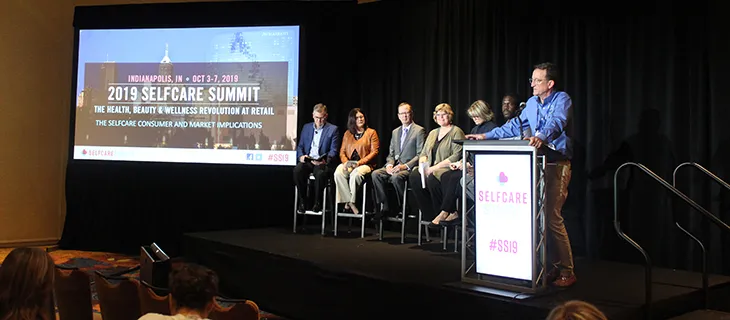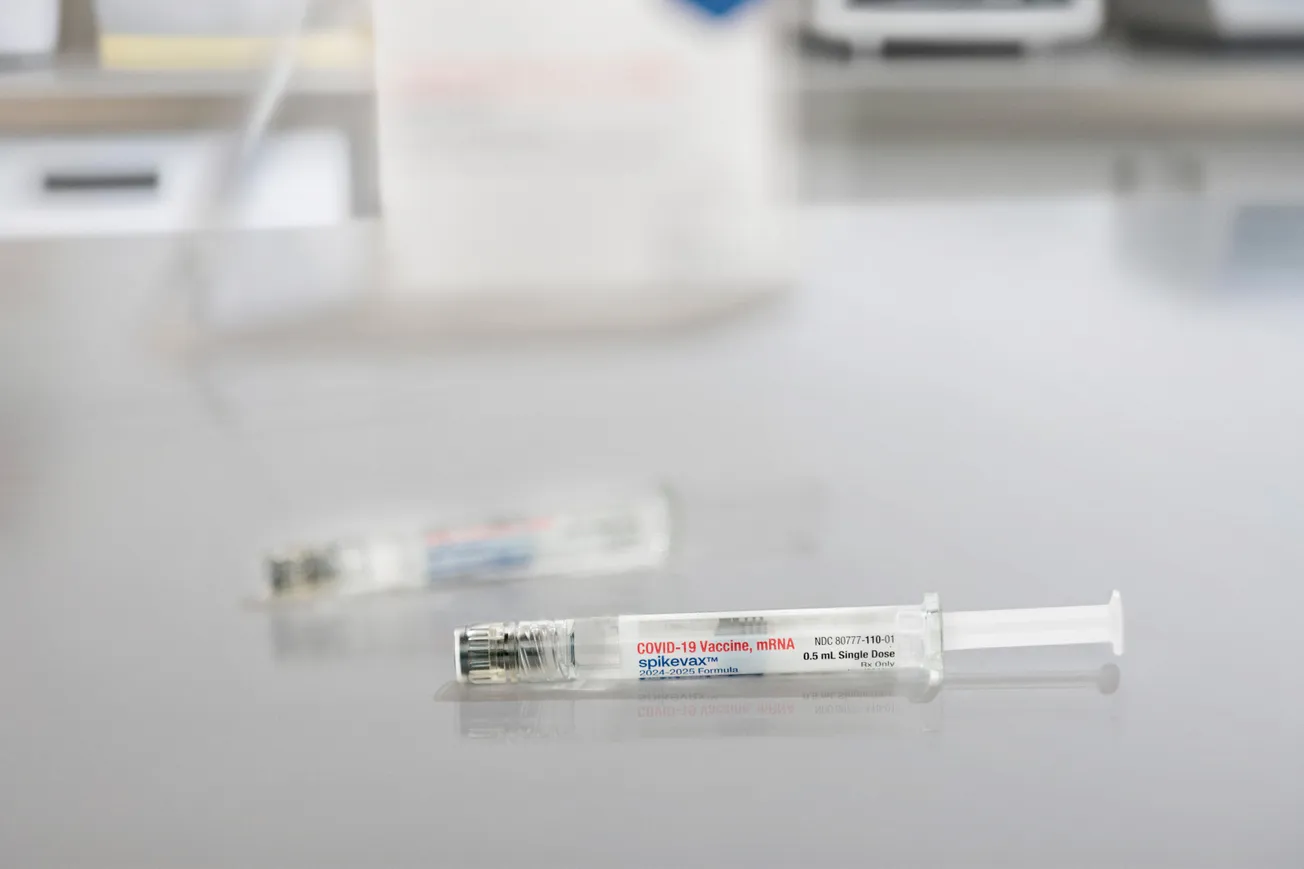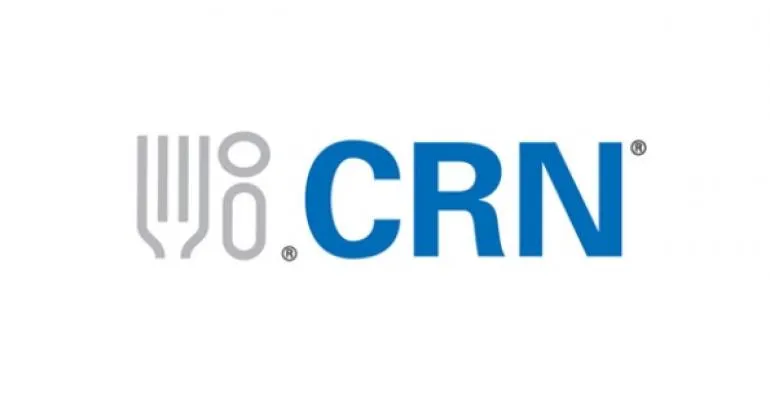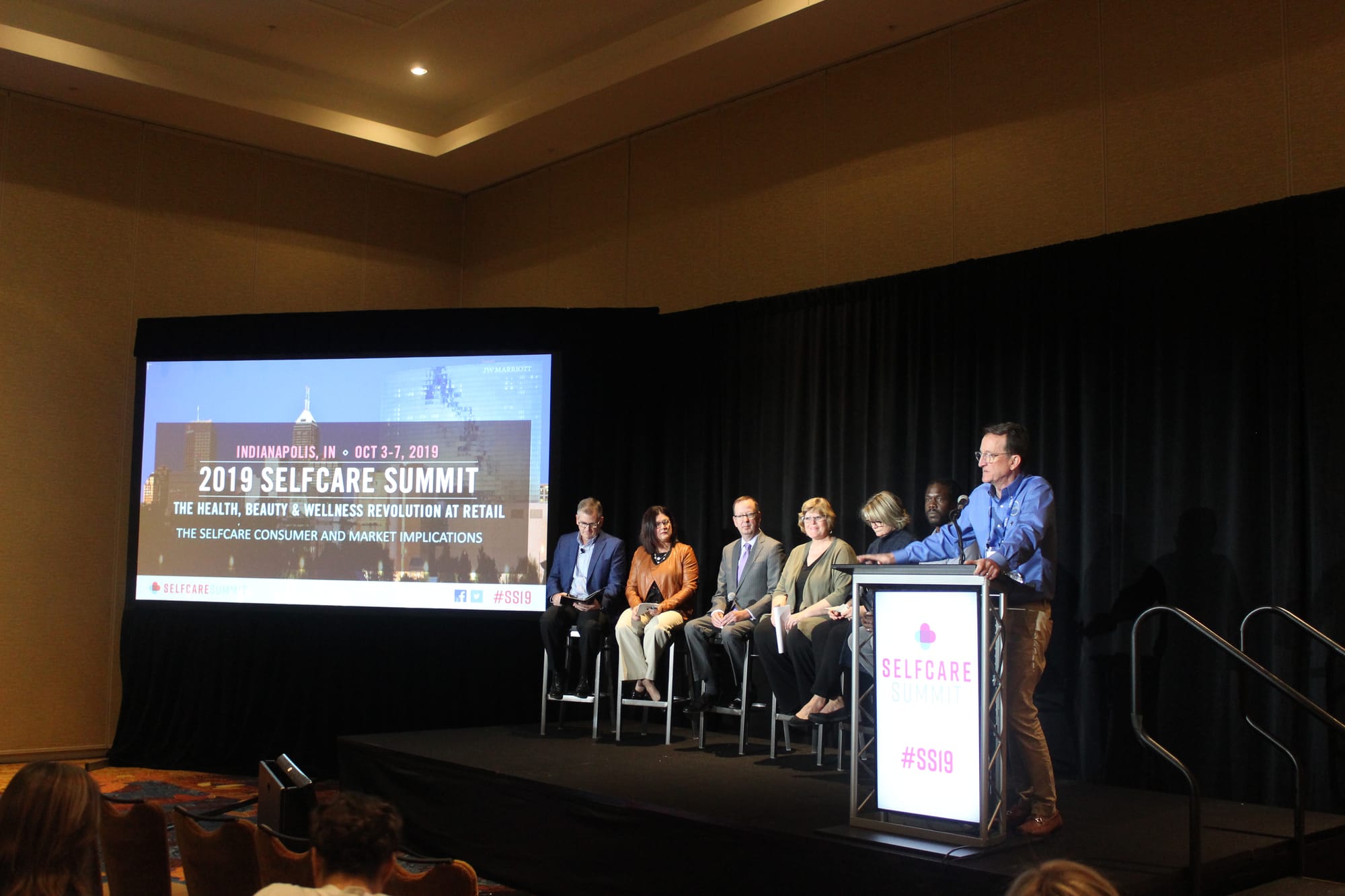
Patrick Spear, president and chief executive officer of GMDC introduces Super Session “What is Selfcare?”
INDIANAPOLIS — This past weekend the Global Market Development Center | Retail Tomorrow (GMDC) held its inaugural Selfcare Summit 2019 conference, a three-day business development and educational event focused on the “consumerization” of health care and its impact on the future of retail here. The summit replaced GMDC’s annual Health Beauty Wellness (HBW) Conference to address the industry’s evolving needs and new milestones that will transform the retail outlook into the future.
“In response to the unprecedented evolution around e-commerce and the migration of core products from physical stores, the Selfcare Summit focuses on helping industry experts address the shift in power from retailers to consumers as well as leading businesses to untapped markets,” said Patrick Spear, president and chief executive officer of GMDC.
“With the rise of health care costs driving new consumer habits and buying patterns, research shows consumers are now opting to control their lifestyle in part by seeking health and wellness solutions within retail, with a concerted focus in grocery, drug and mass. What we think about the industry evolving based on consumer need is that we need to stay engaged with them. We have to meet them where they are, and that might be different than where they were. And if we think about what is self-care, this idea that I want to feel better, I want to live longer, I’m going to think about what I put in or put on my body, our focus in our pivot from a strictly health, beauty, wellness perspective to one that’s more holistic and comprehensive, predicated on self-care is exactly that,” he concluded.
“For today’s consumer, self-care is as much about information as it is about products and services. Our unique research indicates consumers are increasingly looking to retailers to guide their self-care practices. The result of listening to our members and uncovering new consumer behavior trends through our Education Leadership Council and our Retail Tomorrow platform, the Selfcare Summit is further proof of GMDC’s commitment to innovation, reversing current retail trends and creating sustainable growth,” he concluded.
“I think the transformation of the conference really goes back five years ago when Patrick Spear was nominated by our board to be the president and CEO said Mark Mechelse, vice president of insights and communications at GMDC. “In addition, we began to follow the consumer, and we wanted to really bring them into a deeper story to help them understand what are the intrinsic changes going on in the retail market. How does that affect not just the products that they sell, but also the services, the store layout, etc. I think from there it really put us on a journey at that time to help them understand what the store of the future is and how to make retail more relevant. Fast forward leading up to the Selfcare Summit, it has really been about two years in the making, where we’ve transformed our health and beauty to where it’s more category focused. It has taken more of an industry focus, the psyche of the consumer today is really about self-care,” Mechelse added.
The show also coincided with GMDC’s 50th anniversary and represents its evolving focus from connecting suppliers and retailers to fostering uncommon partnerships between retailers, suppliers, technology innovators, market disruptors, health care leaders, clinicians and nutrition experts, among others, to create more opportunities for consumers to access the wellness-oriented products and services they demand.
The Selfcare Summit offered three days of learning tracks aimed at educating attendees on the rise of the shopper and how to evolve from their product-centric past to delivering value in ways that are relevant to today’s consumers.
The event incorporated legacy portions of the former HBW Conference that facilitated face-to-face meetings between retailers and suppliers. The conference introduced industry-first offerings such as Mic-Drop Quick Pitches, during which new companies and innovators had the opportunity to present to an audience of retailers and consumer panels. Each panel offered the opportunity to score the products or services, providing real-time ratings and insights.
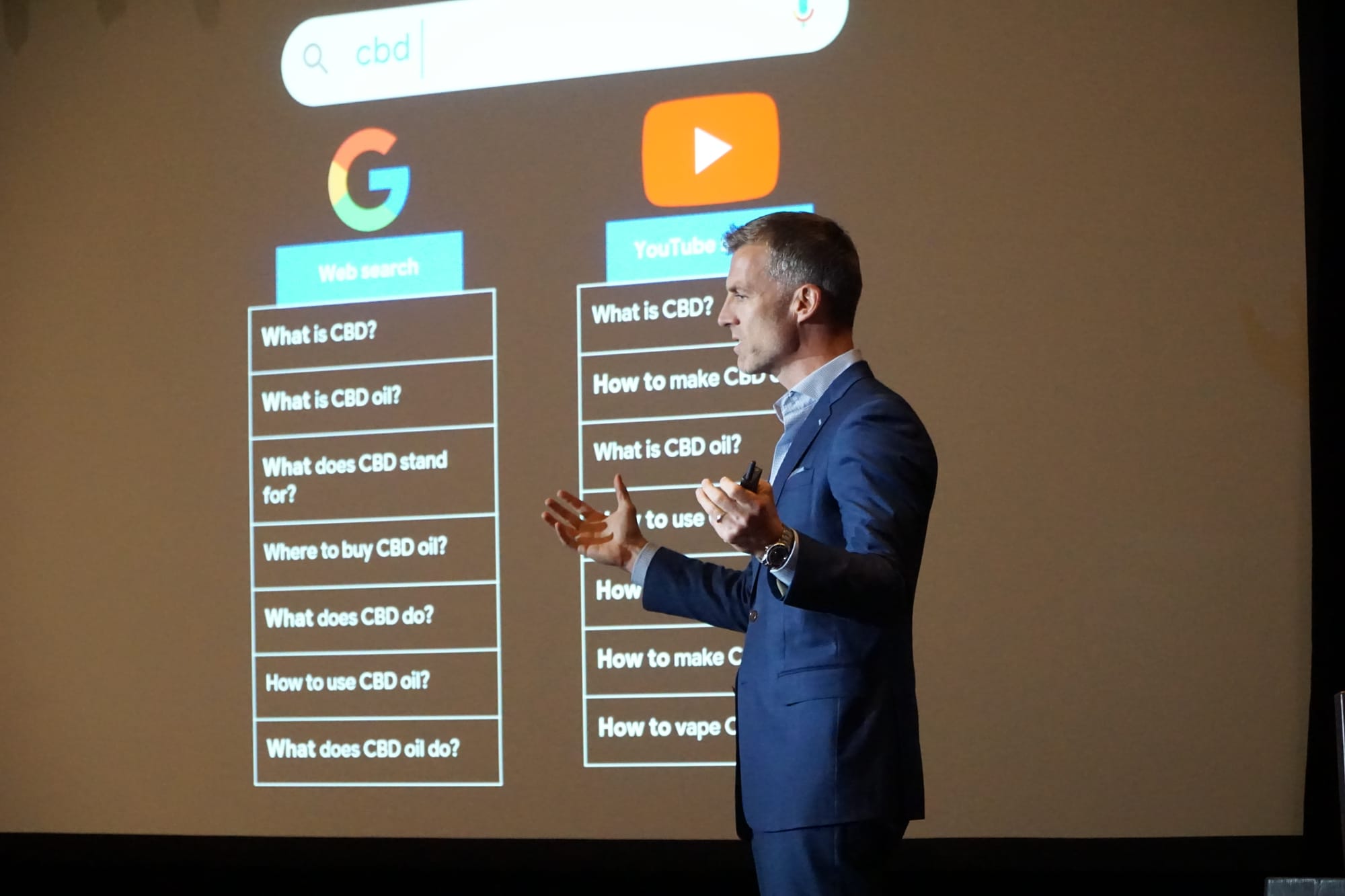
Google’s Ryan Olohan looked at the “Digital Revolution: Are We Keeping Up.”
Ryan Olohan, managing director of health care at Google, kicked off the educational programs with a Super Session that looked at the “Digital Revolution: Are We Keeping Up.” He said that consumers today engage with their mobile phones over 2,600 times everyday. “Every year there are 200 billion searches on Google for health alone, and consumers/patients are more demanding than ever as they look for self-care solutions,” he said.
Dan Stanek, executive vice president at WD partners, spoke about the merging worlds of retail and health care. “Today in health and wellness, retailers are in the ironic role of shaking things up and creating a battle for the nation’s health care services dollar. They are rewriting the rules on how to deliver consumer-centered health care that is cheaper to build and operate and more accessible and convenient for consumers.
Retailers such as CVS Pharmacy, Walgreens and Walmart are becoming more aggressive with the opening of stores that offer a variety of health and wellness products and services,” Stanek pointed out. “For an increasing number of people around the world, wellness is not an outcome, it’s a way of life and even a passion.”
Stanek added that industry disruption/trends are opening a huge opportunity to position brands to grab share in a growing market and tell compelling stories to engaged consumers.
Elliot Lasky, president of Natural Product Group at Nature’s Bounty Co., looked at the role of natural vitamins and supplements. Lasky said that the market is evolving as more and more consumers want transparency in labeling and products. “It’s a conscious choice, starting with the foods they eat, the products they use, the activities they do, where they shop, their social responsibility and how their choices affect the environment and decisions they make, not only for themselves but for their family. Vitamin and supplement brands from the natural channel are entering into the mass channel, and it needs to be looked at as an evolutionary process. While the natural channel has and continues to demonstrate strong growth, “natural sensibility” consumers travel a long continuum that can help determine where and how retailers compete for this more premium shopper.”
He pointed out that with almost 70% of all consumers interested in or already purchasing natural products, natural “sensibilities” across all demographic groups are expanding, with particular emphasis on Gen-X and Millenials. “At 84.6 million, Millennials are now the largest living generation, representing $1.4 trillion in spending power. And Gen X is just as important, as they make up 31% of total U.S. income (although they comprise 25% of the population). So we’re seeing this desire for cleaner vitamins and supplements resonate more with the Millennials and Gen X consumers, as this lifestyle is not something we have to sell them on or educate them on, they are already living it and believe in it.”
Lasky also looked at entry into the category for both retailers and suppliers and the reason for being with natural supplements to engage the consumer and grow the category.
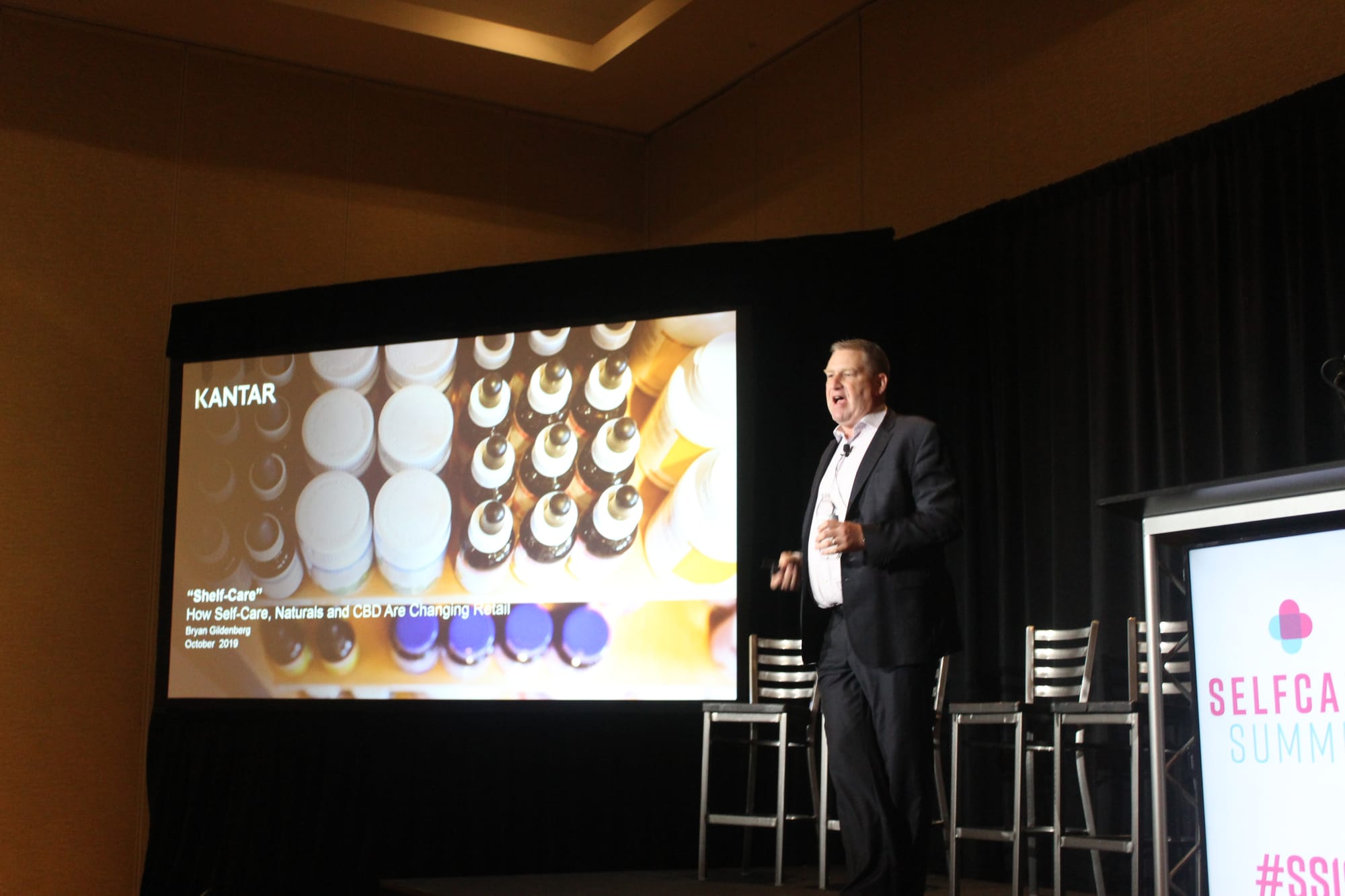
Bryan Gildenberg, chief knowledge officer at Kantar, led off Saturday’s program with a rousing Super Session titled “Shelf Care Re-Engaging Shoppers Through Selfcare Naturals and CBD.
Bryan Gildenberg, chief knowledge officer at Kantar, led off Saturday’s program with a rousing Super Session titled “Shelf Care Re-Engaging Shoppers Through Selfcare Naturals and CBD.” He looked at how many retail business models today are working hard to adapt to a radically changed shopper, competitive and technological world. Gildenberg highlighted the importance of self-care to the future of retail (both physical and digital) today and tomorrow. “Natural products, CBD and other newly available ingredients combined with the holistic notion of self-care can act as “shelf care” … to help best-in-class retailers reimagine their health-related categories and their relationship with tomorrow’s shoppers,” he noted.
Director of insights at Unilever North America Liz Tarpinian talked about the holistic approach to wellness and self-care and how Unilever is approaching the growing importance of this market. The session looked at how the consumer is defining this space and what products and brands are considered to be good for you and why, and how the more natural choices fit into a broader health and wellness lifestyle and mindset.
Meanwhile, another Super Session offered a panel discussion on “What Is Self Care?,” which featured panelists Caron Merrill, director of customer insights at CVS Health, and Naomi Duvall, vice president of consumer health and manufacturer services at Cardinal Health.
The conference offered a number of sessions on CBD, including “CBD, How Three Letters are Driving Triple Digit Growth.” Xochitl Javier, vice president of data Innovation at SPINS, and Sarah Schmansky, vice president of growth strategy at Nielsen, said CBD continues to be a promising new market within the health and wellness industry. “Many are calling this moment a gold (or green) rush, and the ambiguous terms of CBD’s legality add a Wild West element to the industry’s rapid growth,” said Javier. “For more than 20 years, SPINS data has tracked specific product characteristics driving sales at retail: Our coding captures more than 600 functional ingredients with unique granularity, including newcomers like CBD and other cannabinoids. Through this lens, we can see that, even under the limitations of the current legal climate, products containing CBD and cannabinoids have grown an astonishing 384% in sales in traditional retail channels over the last year — and it feels like it’s just the beginning,” she added. “Retailers, brands and investors are acting fast and betting big, resulting in a flurry of new product innovation, already showing up in more than a dozen categories across food, beverage, body care and supplements,” Schmansky noted.

